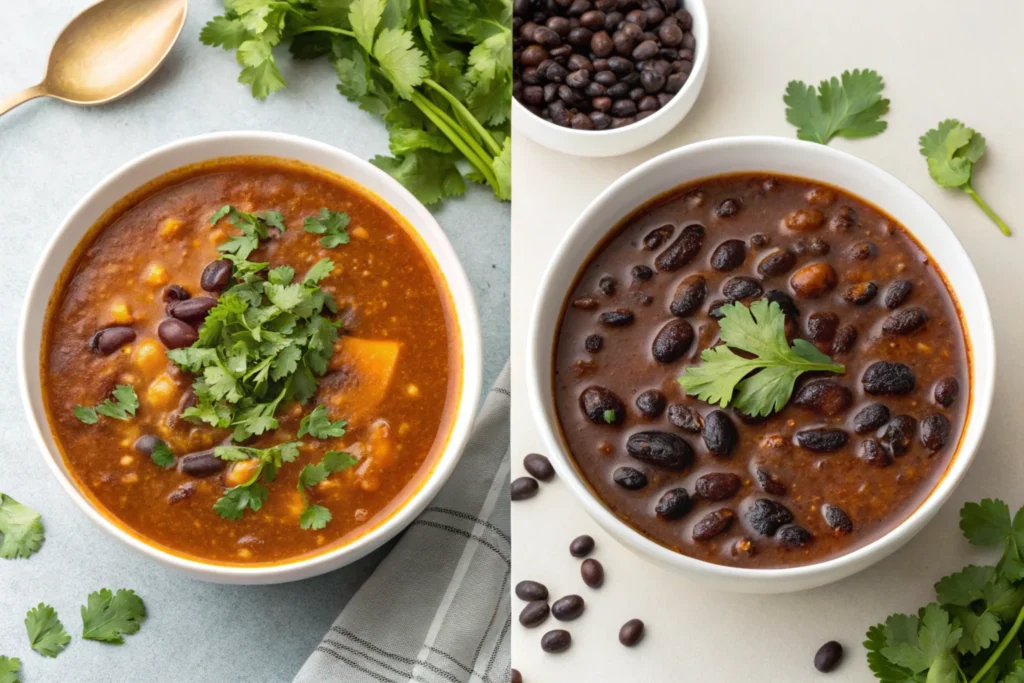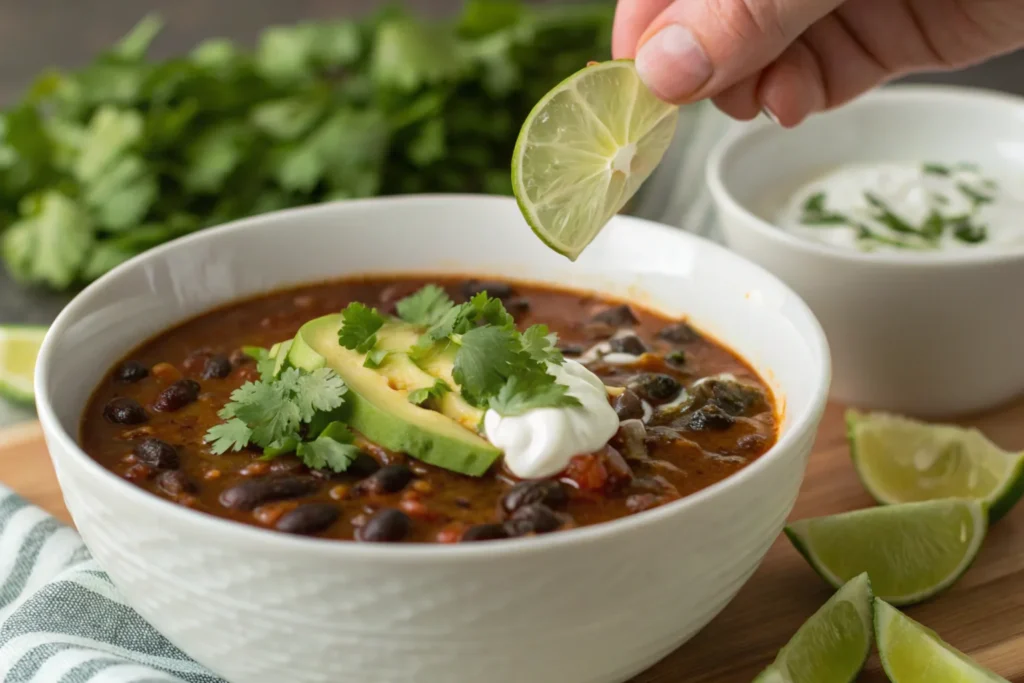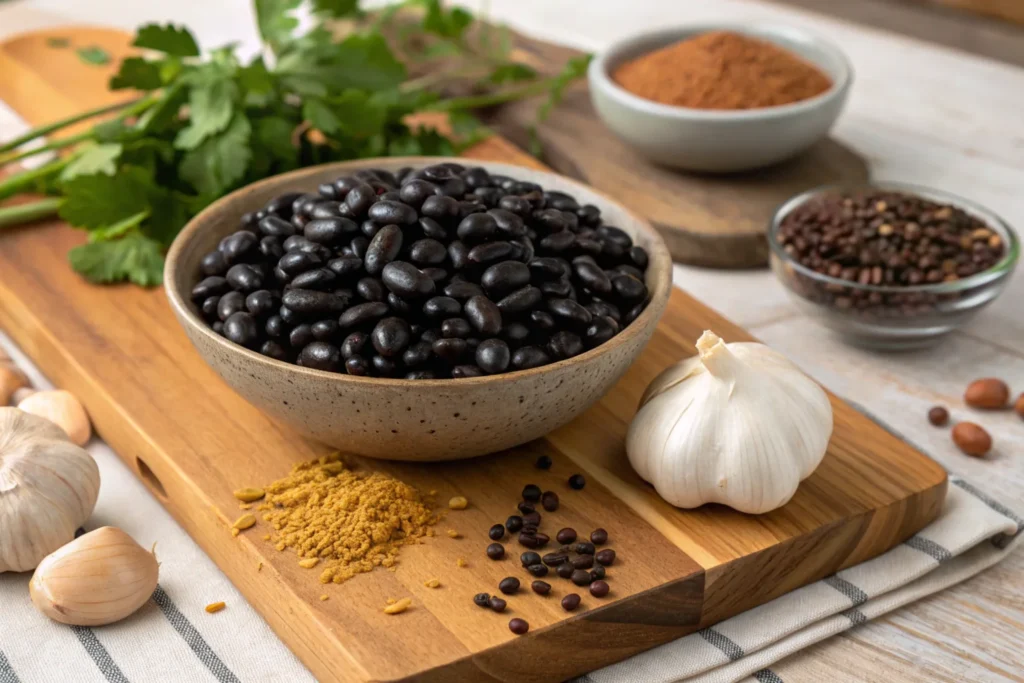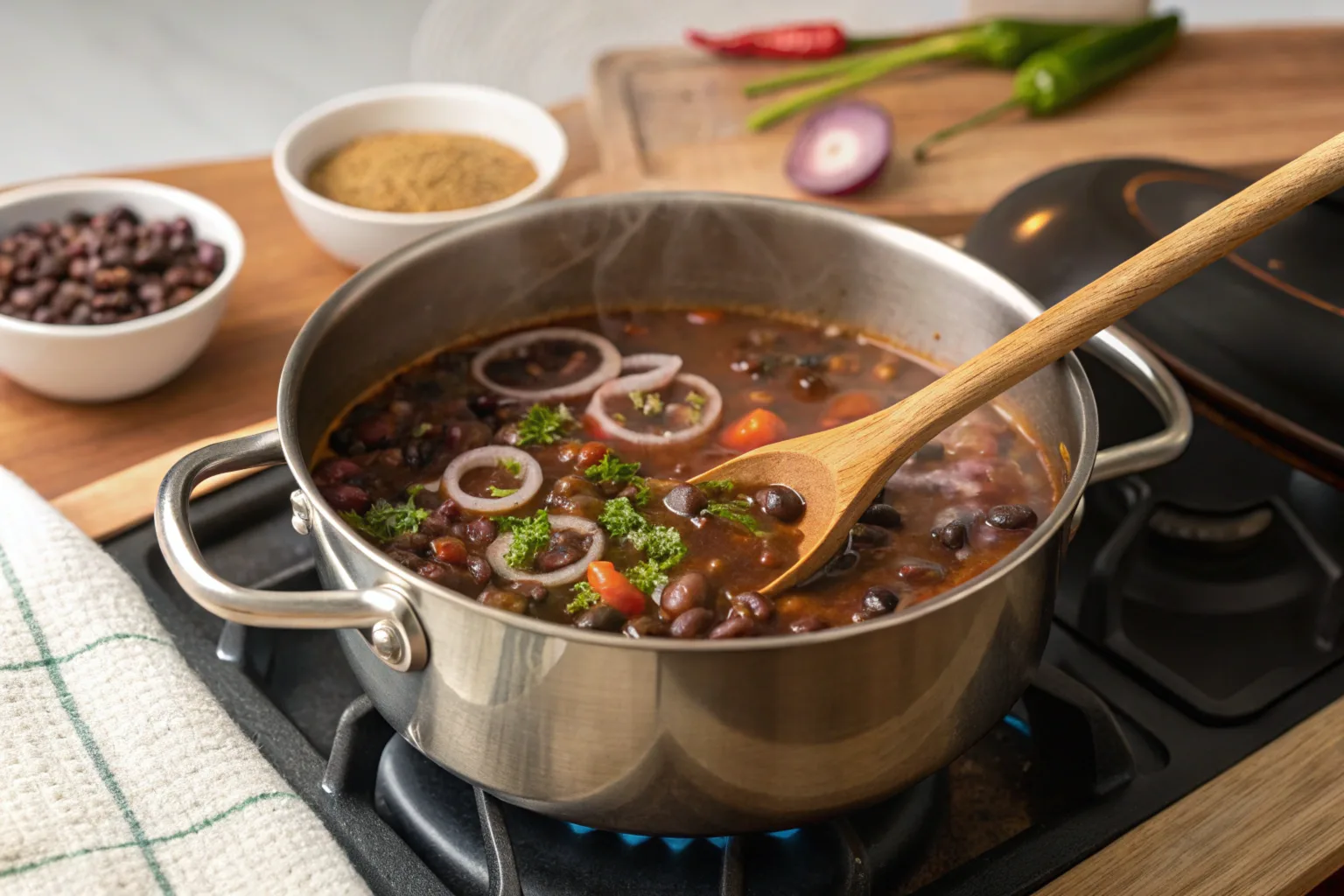There’s something magical about a steaming bowl of black bean soup. It’s hearty, healthy, and incredibly satisfying—especially on a chilly evening. But what happens when that perfect bowl takes a bitter turn? Suddenly, your cozy dinner feels like a culinary disaster.
Bitterness in black bean soup can be frustrating and leave you wondering where you went wrong. Why does my black bean soup taste bitter? Is it the beans? The spices? Maybe something burned? The good news is, you’re not alone, and the problem is easier to fix than you might think. In this guide, we’ll explore the common reasons why black bean soup turns bitter, how to fix it, and, most importantly, how to prevent it from happening next time. So grab your apron, and let’s dive in!
Common Reasons Your Black Bean Soup Tastes Bitter
Bitterness can sneak into your soup in several ways, and identifying the root cause is the first step to solving the problem. Let’s break it down:

Why Old or Stale Black Beans Make Black Bean Soup Taste Bitter
If you’ve ever used beans that have been sitting in the pantry a little too long, you might notice they don’t taste quite right. Stale or old black beans can develop off flavors, including bitterness. This is especially common with dried beans that haven’t been stored properly. Even canned beans can sometimes carry a slightly metallic or bitter aftertaste if they’re past their prime.
To avoid this, always check the expiration date on your beans and give dried beans a sniff test before cooking. For recipes like this classic black bean soup, using fresh, high-quality beans can make all the difference.
How Overcooking Aromatics Causes Bitterness in Black Bean Soup
Spices like garlic, onions, and chili powder are the backbone of many black bean soup recipes, but they can be tricky to cook with. If you overcook these aromatics, they can quickly turn bitter, especially garlic, which burns easily. This bitterness can spread throughout the soup, overpowering the other flavors and leaving you asking, “Why does my black bean soup taste bitter?”
The solution? Sauté these ingredients gently over medium heat, stirring often. Watch for signs that they’re turning golden but not brown.
Can Burnt Ingredients Be the Reason Why Black Bean Soup Tastes Bitter?
It’s easy to miss, but burnt bits at the bottom of your pot can be a major source of bitterness. This often happens when beans or vegetables stick to the pot during cooking. Once those burnt flavors seep into the soup, they’re hard to disguise.
To prevent this, stir frequently while cooking and deglaze the pot with a splash of broth or water if anything starts to stick.
Do Certain Vegetables Make Black Bean Soup Taste Bitter?
Did you toss in some kale, spinach, or green peppers? While these veggies are healthy and flavorful, they can introduce bitterness, especially if they’re overcooked. Even too many tomatoes, depending on the variety, can make your soup taste a bit off.
Why Too Much Seasoning Can Make Black Bean Soup Taste Bitter
Seasoning is all about balance. While spices like cumin, oregano, and black pepper add depth, going overboard can lead to an unpleasant bitterness. Likewise, using too much salt without enough acidity or sweetness to balance it can make the soup taste harsh.
How to Fix Bitter Black Bean Soup
If your soup has already turned bitter, don’t worry—you’ve got plenty of options to salvage it.

Add a Touch of Sweetness to Balance the Flavor
A small amount of sweetness can work wonders for balancing bitterness. Try adding a teaspoon of sugar, honey, or maple syrup. You can also incorporate naturally sweet ingredients, like cooked carrots or sweet potatoes. This technique works beautifully in recipes like this Southern sweet potato pie, and it’s just as effective in soups.
Use Acidity to Cut Through Bitterness
Acidic ingredients like lime juice, apple cider vinegar, or even tomatoes can help neutralize bitter flavors. Add a little at a time, tasting as you go to avoid overdoing it. If you’re still wondering, “Why does my black bean soup taste bitter?”, a splash of lime might be all it needs to brighten the flavors.
Incorporate Fat for a Smoother Taste
Fats have a magical way of softening harsh flavors. Stir in a tablespoon of olive oil, butter, or coconut milk. For a creamy twist, try adding sour cream, yogurt, or even a drizzle of avocado puree.
Dilute the Soup with Broth or Water
If the bitterness is too intense, diluting the soup may be the simplest fix. Add a cup of broth or water to spread out the flavors and then adjust your seasonings to maintain balance.
Strain Out Bitter Ingredients
If you suspect burnt bits or overly bitter vegetables are the problem, strain the soup to remove those elements. Reheat the liquid and adjust the flavors with fresh ingredients.
Preventing Bitterness in Black Bean Soup
Prevention is always better than cure. By taking certain precautions during the cooking process, you can avoid bitterness altogether.

Start with Fresh, Quality Ingredients
Using fresh black beans and spices ensures better flavor and reduces the risk of bitterness Stale ingredients are often the answer to, “Why does my black bean soup taste bitter?”
Tip: If you’re using canned beans, consider whether to drain them. The liquid in canned beans can sometimes contribute to bitterness. Check out this guide on should you drain black beans for soup for more information.
Cook Aromatics and Spices Carefully
Properly cooking your aromatics and spices is crucial. Overcooking or burning them can introduce unwanted bitter flavors.
Tip: Sauté onions and garlic until they’re soft and translucent, not browned. Toast spices lightly to release their aromas, but avoid burning them. Adding spices later in the cooking process can also prevent them from becoming bitter.
Balance Flavors with a Proper Base
Creating a well-balanced base sets the tone for your entire soup. Using a combination of broth, tomatoes, and the right seasonings can prevent bitterness.
Tip: Incorporate ingredients that naturally balance bitterness, such as sweet bell peppers, carrots, or corn. For inspiration, you might explore recipes like this vegan cornbread dressing that balances flavors beautifully.
Avoid Overcooking or Burning the Beans
Cooking beans for too long or at too high a temperature can cause them to break down and release bitter compounds.
Tip: Simmer your soup gently and keep an eye on the cooking time. If using dried beans, ensure they’re soaked adequately and cooked until just tender.
FAQs About Bitter Black Bean Soup
You can balance the bitterness by adding a touch of sweetness, like sugar or honey, or acidity, such as lime juice or vinegar. Fatty ingredients like olive oil or sour cream can also smooth out harsh flavors. If the bitterness persists, try diluting the soup with broth or straining out overcooked or burnt ingredients.
Black beans can taste bitter if they’re old or stale, overcooked, or paired with burnt spices or vegetables. The liquid from canned beans might also add bitterness if it’s not balanced with other ingredients.
Add sweetness, acidity, or fat to counteract bitterness. You can also rinse canned beans thoroughly before use or cook dried beans with aromatics like garlic and bay leaves for a smoother flavor.
The best way to neutralize bitterness is to balance the flavors. Sweeteners, acids, and fats can all help. Diluting the soup with broth or water is another effective way to mellow the taste.
A combination of sweet, acidic, and fatty ingredients usually works best. For soups, a teaspoon of sugar or honey, a splash of vinegar or citrus, or a dollop of cream can restore balance.
Overcooked black beans tend to fall apart easily and release a mushy texture into the soup. They may also develop a slightly bitter or overly earthy flavor. Properly cooked beans should hold their shape and have a creamy, not mushy, texture.
Conclusion
If you’ve been asking, “Why does my black bean soup taste bitter?”, don’t worry—it’s a fixable issue, and you’re not alone! Bitterness can come from overcooked beans, burnt ingredients, or unbalanced seasonings, but with the tips in this guide, you can rescue your soup and even prevent the problem in the future.
Remember to:
- Use fresh, quality ingredients.
- Cook aromatics and spices carefully.
- Balance flavors with sweet, acidic, and fatty components.
- Monitor cooking times to avoid overcooking.
Cooking is as much an art as it is a science. Don’t be afraid to adjust recipes and experiment with flavors. Over time, you’ll develop an intuition for creating perfectly balanced dishes.
For more delicious recipes and cooking tips, check out our classic black bean soup or try pairing your soup with a refreshing spicy cucumber salad. And if you’re in the mood for something indulgent, don’t miss our deviled eggs recipe—it’s a crowd-pleaser!
Happy cooking!


3 thoughts on “Why Does My Black Bean Soup Taste Bitter? (And How to Fix It)”
Comments are closed.